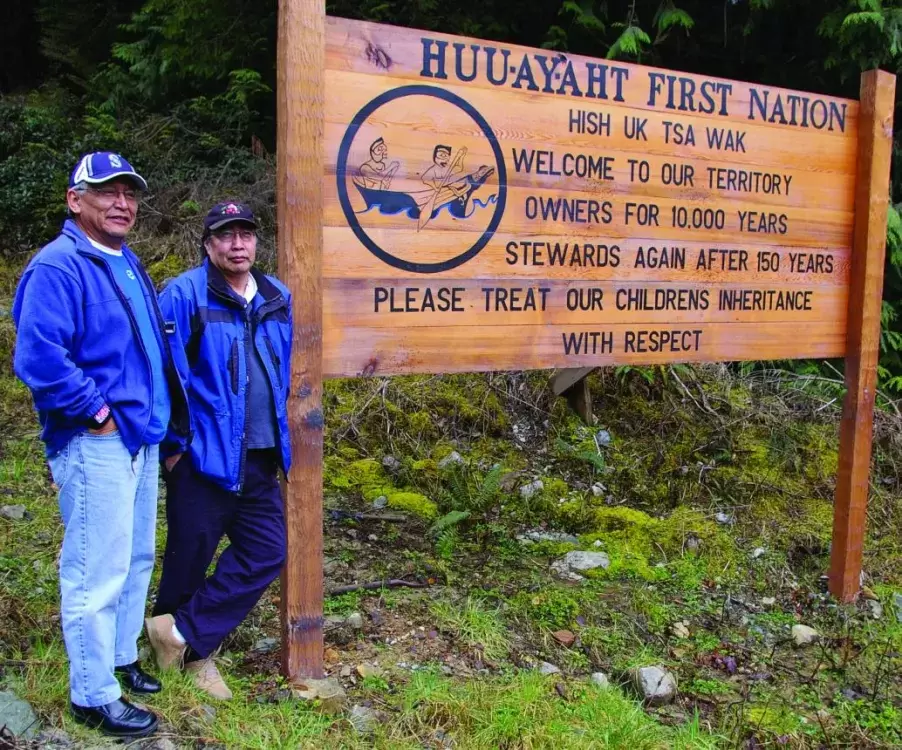The Province of British Columbia dropped their legal appeal of a forestry case recently won by the Huu-ay-aht First Nation, but Chief Councilor Robert Dennis fears the government might ignore their victory.
The Huu-ay-aht First Nation sued the provincial government in 2004 alleging Forest Range Agreements were being negotiated illegally.
The crux of the case was that BC negotiators focused on a population based formula for enticing First Nations throughout the province to sign FRA’s, instead of basing compensation agreements on the level of infringement.
“The population based formula is illegal and not in good faith,” said Huu-ay-aht Chief Councilor Robert Dennis. “The accommodation should be based on the level of infringement, not population, and the level of logging in our territory was and is excessive,” he said.
In their negotiations with the 200 BC First Nations, provincial negotiators applied a formula of $500 and 30 cubic meters of timber for every registered member of the individual First Nation over 5 years, regardless of the economic value of forestry within their territories.
By signing an FRA, the First Nation acknowledges it has been fully consulted on the forest resource development plan within their traditional territory, and waives any future Aboriginal rights, title or infringement claims.
Throughout the last century, the Huu-ay-aht First Nation saw 14.25 million cubic meters of wood leave their territory, worth hundreds of billions of dollars.
In her concluding remarks to the 6-day trial held in January and February 2005, BC Supreme Court Justice Dillon wrote: “to fail to consider at all the strengths of claim or degree of infringement represents a complete failure of consultation based on the criteria that are constitutionally required for meaningful consultation. While a population-based approach may be a quick and easy response to the duty to accommodate, it fails to take into account the individual nature of the HFN claim. In this case, the government did not misconceive the seriousness of the claim or impact of infringement. It failed to consider them at all. The government acted incorrectly and must begin anew a proper consultation process based upon consideration of appropriate criteria”.
Though the ruling was a wrist-slapping for the provincial government, Dennis fears little will change.
In a letter from the BC Government, their lawyer Glen Thompson wrote: “we wish to make it clear that the province has not altered its position with respect to the decision of Madam Justice Dillon and continues to be of the view that the case was wrongly decided”.
“If they’re acting on the honor of the crown, they have to abide by the court’s ruling,” said Dennis. “Saying the ‘court decided wrongly’, and that they’re entrenched in their position could hinder our ability to move forward,” he said. “This will have serious impacts on treaty negotiations because how can they say they’re negotiating in good faith when they’re not applying the letter of the law? How can we sit down with a government that says they’re outside the law?”
The case could have wide-reaching effects, not only on the more than 100 First Nations who signed FRA’s and many others currently in discussion with the BC Government on FRA’s, but also on the treaty process as a whole.
“They’re using population-based formulas in treaty, so if it’s not fair in this case [forestry], how can it be fair there [treaty],” said Dennis, whose Nation was prevented from negotiating any forestry issues in treaty negotiations for two years while this case wound its way through the court system. “Is the population-based formula a fair process? Based on the ruling, I would say ‘no’,” he said.
Numerous BC Government Ministers were invited to comment on this story, but did not return our calls.
By David Wiwchar
Ha-Shilth-Sa Reporter







